|
60 Folkestone Road before 1913   also also
121 Folkestone Road
 (1-2 Priory Terrace) (1-2 Priory Terrace)
Dover
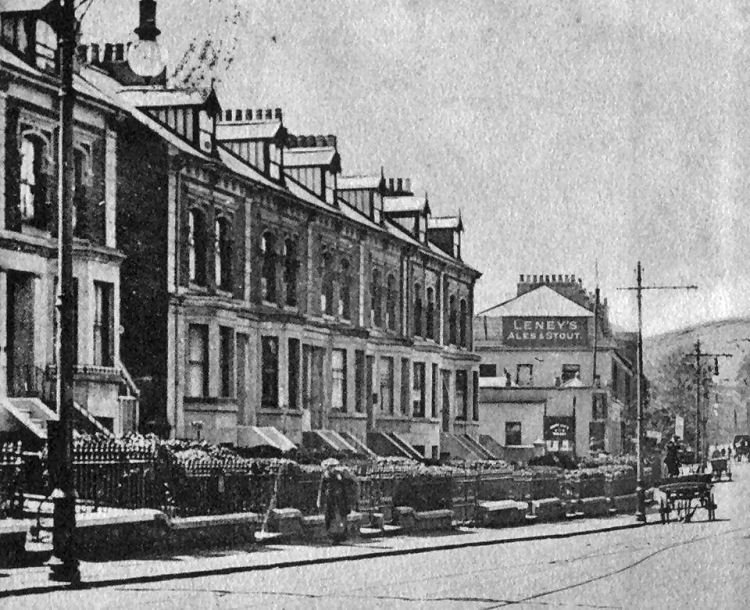
Above photo, circa 1916. Kindly sent by John Linge. |
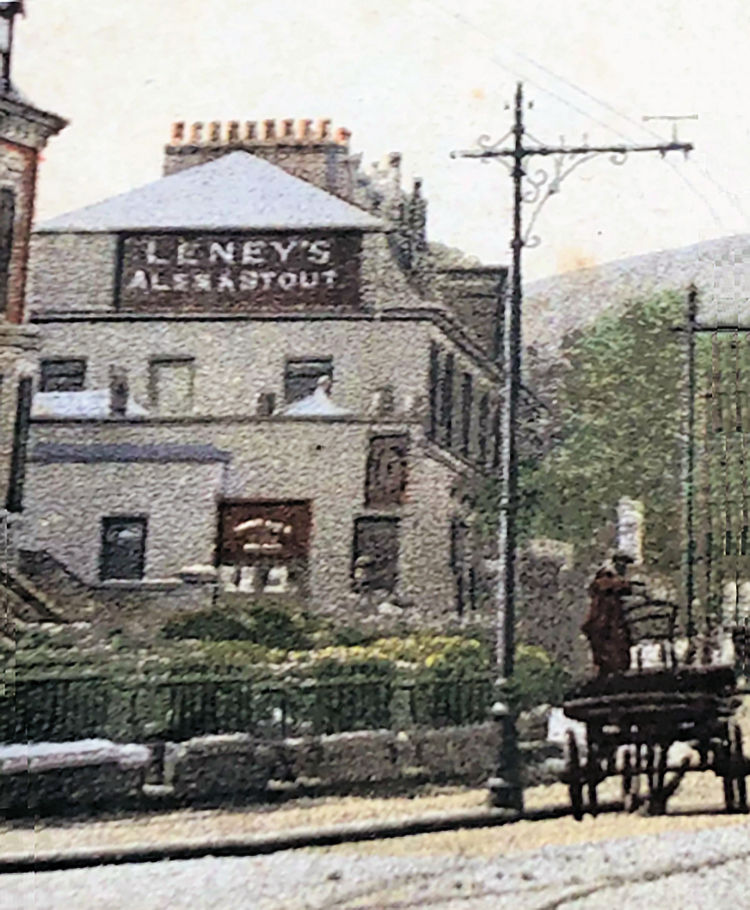
Above photo, circa 1916. Kindly sent by Rory Kehoe. A Leney's house,
offering beers from their Phoenix Brewery, Dover. |
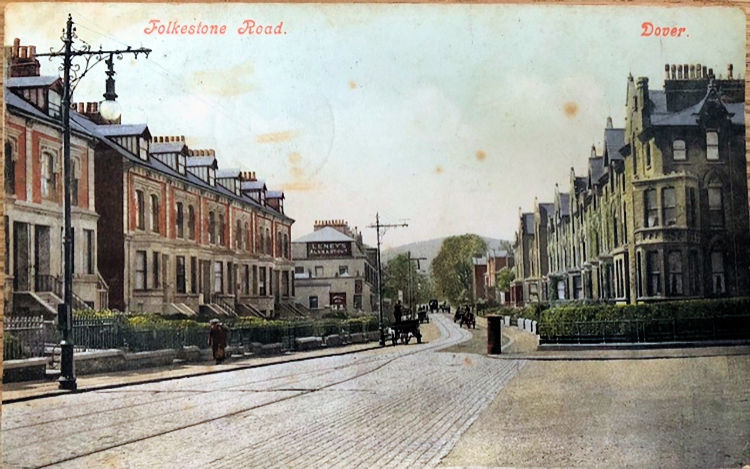
Above postcard, postmarked 1918. Kindly sent by Keith "Dicky" Daniel. |
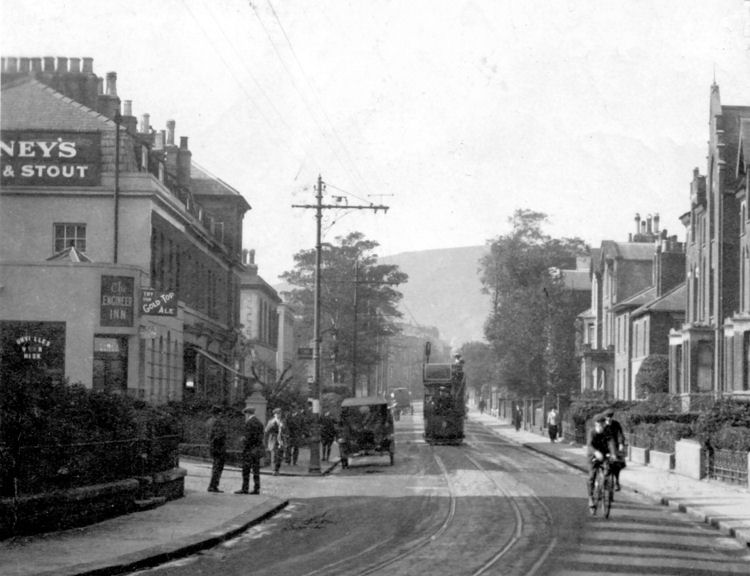
Above postcard, postmarked 29 January 1925. Kindly sent by Graham
Butterworth. |
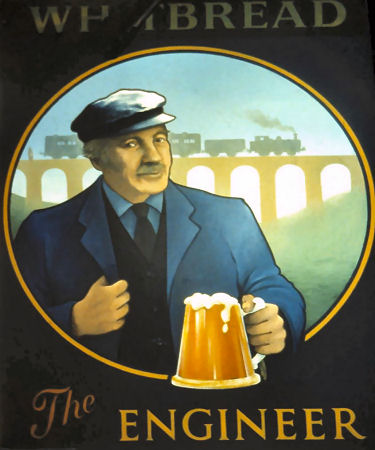 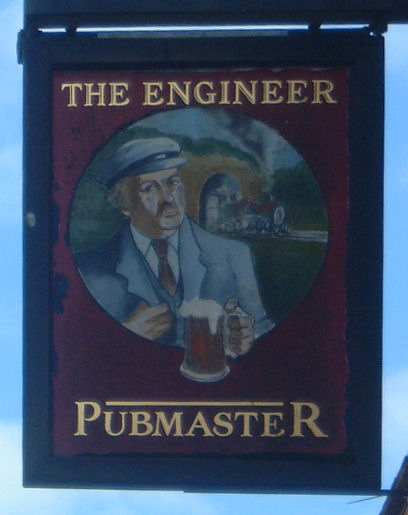
Above sign left 1990, sign right 2006.
With thanks from Brian Curtis
www.innsignsociety.com. |
|
From an article in the Dover Mercury 27 January 2000 by Joe Harman.
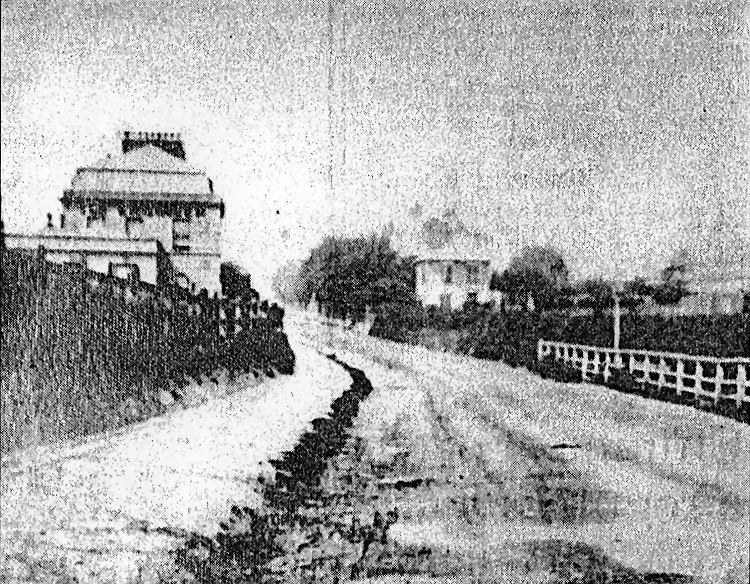
THIS photograph of Folkestone Road appears to have been taken about
1865.
The building on the left is obviously The Engineer public house, which
was there according to the census of 1871.
The one over to the centre is almost certainly Laburnham Cottage as this
shows up on a map of 1859 with Sultrana Villa beyond it.
The latter is now the Mildmay Hotel and this was built for Mr Rowland
Rees as well as Canton Villa, which is linked with his former service as an
architect in Hong Kong.
He was the surveyor for the Dover Harbour Board and later became Mayor of
Dover.
Looking at the picture, closely, you can see the outline of Westmount,
which was built in 1865 by Philip Stiff. At a later date, Beaumont Terrace
was built where the white railings are pictured.
|
|
From the Kentish Gazette, 14 February 1865.
DOVER. Coroner’s Inquest.
On Saturday afternoon the borough coroner, W. H. Payn, Esq., held an
inquest at "The Engineer," Folkestone-road, on the body of a man
named Stephen Tucker, a labourer, who had committed suicide the
previous day by hanging himself at his bedside. The unfortunate man
was shown to have been subject to fits of despondency, he was the
husband of a hard-working and respectable woman, who is a laundress,
and the thought that he was, through ill-health, compelled to live
upon her earnings seems to have proved upon his mind, and ended in
the desperate act which was the subject of this inquiry. The
deceased, it was stated in evidence, was afflicted with some malady
winch affected his breath, and in consequence he had been unable to
work since October last. He had complained of his head during the
last week or two, and had committed some strange and unaccountable
acts. On one occasion he was about to throw his watch to the end of
the room, and his son had to interfere to prevent him. He had not
been sufficiently well to get up on the previous morning, and his
wife took him some tea about ten o'clock. He had hurt his finger a
short time before and the wife made some enquiry as to it. His reply
was that his finger was better, but that his head felt bad. Nothing
more was heard or seen of him till he was found suspended by his
braces at the foot of the bed. This was about one o’clock, Mrs.
Tucker sending a little girl (a niece) upstairs about that time to
enquire if her uncle could get up to dinner. She returned saying the
door was fastened, and on an entrance being effected he was
discovered as described. The deceased must have exercised a great
degree of determination, the bedstead being a French one, and
therefore a short post. His legs were thus stretched along the
floor, although he had managed so to place himself as to throw the
weight of the body upon the noose he had formed, and so by pressing
the larger vessels of the neck cause a rushing of blood to the bend,
producing paralysis of the brain, which, in the opinion of Mr. A. G.
Osborn, the surgeon who was called, was the proximate cause of
death. The jury returned a verdict of "Temporary Insanity."
|
|
From he Canterbury Journal, 18 February 1865.
Coroner’s Inquest.
On Saturday afternoon the borough coroner, W. H. Payn, Esq., held an
inquest at the "Engineer," Folkestone-road, on the body of a man named
Stephen Tucker, a labourer, who had committed suicide the previous day
by hanging himself at his bedside. The unfortunate man was shown to have
been subject to fits of despondency. He was the husband of a
hard-working and respectable woman, who is a laundress, and the thought
that he was, through ill-health, compelled to live upon her earnings
seems to hare preyed upon his mind, and ended in the desperate act which
was the subject of this inquiry. The deceased it was stated in evidence,
was afflicted with some malady which affected his breath, and in
consequence he had been unable to work since October last. He had
complained of his head during the last week or two, and had committed
some strange and unaccountable acts. On one occasion he was about to
throw his watch to the end of the room, and his son had to interfere to
prevent him. He had not been sufficiently well to get up on the previous
morning, and his wife took him some tea about ten o’clock. He had hurt
his finger a short time before, and the wife made some enquiry as to it.
His reply was that his finger was better, but that his head felt bad.
Nothing more was heard or seen of him till he was found suspended by his
braces at the foot of the bed. This was about one o’clock, Mrs. Tucker
sending a little girl (a niece) upstairs about that time to enquire if
her uncle could get up to dinner. She returned, saying the door was
fastened, and on an entrance being effected he was discovered as
described. The deceased must have exercised a great degree of
determination, the bedstead being a French one, and therefore a short
post. His legs were thus stretched along the floor, although he had
managed so to place himself as to throw the weight of the body upon the
noose he had formed, and so by pressing the larger vessels of the neck
cause a rushing of blood to the head, producing paralysis of the brain,
which, in the opinion of Mr. A. G. Osborn, the surgeon who was called,
was the proximate cause of death.
The jury returned a verdict of "Temporary insanity."
|
|
From the Kentish Gazette, 14 March 1865.
Fatal Accident on the London, Chatham, and Dover Railway.
Yesterday, at noon, the borough coroner, W. H. Payn, Esq. held an
inquest at the "Engineer Inn," Folkestone Road, on the body of John
Hart, a man who had been in the employ of the London, Chatham and
Dover Railway Company, and who met with his death on Saturday
evening last, having been struck down in the tunnel between the
harbour station and the station at the Priory, by the down train due
at Dover at 7 o'clock. From the evidence it appeared that the
deceased was engaged in the permanent way department on the line,
and was accustomed to being in tunnels, his duly rendering his
frequent passage through the tunnel near to the Dover station
necessary. At the time of the accident however, he was not on duty,
his time being up at four o'clock in the afternoon, and he was in
all probability, passing through the tunnel as a near cut to his
place of residents, it appearing that he lived near to the Priory
Station, when the unfortunate occurrence took place. On the train
passing through the tunnel, the guard felt his break pass over
something on one of the rails, but the engine driver felt nothing.
On investigation being made, the deceased was found in a frightfully
mutilated state, quite lifeless, about 150 yards within the tunnel,
lying nearest the wall across the line of rail nearest to him. From
the description of the tunnel afforded by Mr. S. C. Best, the civil
engineer having charge of the district between Faversham and Dover,
it would seem that the deceased, instead of lying down on the
six-feet, on meeting the train, in accordance with the orders given
to all workmen on the line, whose duties call them to pass through
the tunnels, endeavoured to stand against the wall. There was a
distance of 2 ft. 6 in. between the carriages and the wall of the
tunnel, but although this was sufficient room to permit a man to
stand the rush of air caused by the rapid motion of a train was
sufficient to throw a man down, and the fact that the engineer felt
nothing unusual in passing the spot, while the guard did, was strong
presumptive proof, together with the position in which the body of
deceased was found, that the accident occurred in this way.
The jury returned a verdict of "Accidental Death."
|
|
From the Dover Express and East Kent Intelligencer,
31 October, 1879. Price 1d.
CLARENDON STREET
To the Editor of the Dover Express.
Sir, - it is high time something was done to improve the approach to
this street by way of the "Engineer" public-house. At present it is
inaccessible after a shower of rain by foot passengers having regard for
a clean appearance, while as for getting a perambulator into the
Folkestone Road it is quite out of the question. The street itself is
nearly as bad. Notwithstanding the heavy wear to which the road has been
subjected during the last year or two, I believe I am correct in stating
that nothing has ever been done to it in the way of repairs, and the
impression is that nothing will be done until the street is completed.
As this cannot be for many months to come, residents are beginning to
contemplate whether with considerable dismay the prospect before them
when the winter has finally set in.
Being of opinion that this is the state of things which ought not to
exist in relation to a thoroughfare used by some hundreds of
inhabitants, is the apology for troubling you - or your obedient
servant,
A SUFFERER.
Dover, October 1879.
|
|
From the Dover Express and East Kent Intelligencer,
21 November, 1879. Price 1d.
CLARENDON STREET
To the Editor of the Dover Express.
Dear Sir, - With your indulgence I beg again to direct attention to
the dreadful condition of the approach to this street. It is not only
inaccessible with any degree of comfort, but is absolutely
dangerous at night, the deep ruts and the absence of any lamp making it
difficult to get a safe footing. Whether the buildings in connection
with the road are to be finished within a month or within a year, the
present convenience of the inhabitants ought no longer be ignored.
By and bye someone may slip down and break a limb, and then everyone
will be asking why the road is not allowed to remain in so a dangerous
condition.
is it because the population of the Clarendon Estate do not belong to
the "Upper Pen?"
Thanking you for the favour of publication,
I remain, dear sir,
Your obedient servant,
A SUFFERER.
Dover, November, 1879.
|
|
From the Dover Express and East Kent Intelligencer,
12 December, 1879. Price 1d.
CLARENDON STREET
To the Editor of the Dover Express.
Dear Sir, - Will you kindly allow me one more trespass upon your
indulgences with the object of representing another very real grievance
which the residents of this street have to prefer; and not the resident
only, but every person having business or other connections with the
street. It regards the numbering of the houses. It seems that instead of
being number consecutively from the buildings first erected, several
batches of houses are numbered according to the whim of the owners, and
thus we have a chaos of numbers which - like Milton's excess of light -
serve rather to obscure than to guide. If this indiscriminate numbering
were intended as a mere exhibition of artistic confusion, it might be
allowed to pass without any comment save that suggested by its obvious
merits; but I wish to point out that it involves a grave inconvenience.
People are continually calling at the wrong houses, giving the occupants
and themselves a vast deal of unnecessary trouble. At night the evil is
aggravated by the absence of lamps, and the heaps of rubbish and other
obstructions in the newer half of the street.
It is indeed increasingly evident that the interests of this street
have been grossly neglected; or more accurately the interests of the
people who have been obliged to choose a residence in it. I say obliged,
because it is a great hardship for a great many, having their employment
at the Pier District, to reside there at all; but a hardship which I do
not see how it is possible to obviate, unless it were considered more
benevolent to utilize the meadow near Archliff Fort for cottage building
than as a recreation ground.
The origin of the evil rests with the Council, inasmuch as it allowed
the railway companies to eject inhabitants from the Pier District,
before adequate provision had been made for them in some other part of
the town. How is it is so obvious a difficulty was not anticipated, and
properly met? Is the Council aware that people have been allowed to
occupy houses in this street which were minus doors, windows, water
closets, and in one instance even a fire grate? yet such which I am told
is a fact.
But it is useless to dwell upon the past, except in as far as it
seems necessary to bring home responsibility to those with whom it
rests. The thing is, to make reparation for the injury that has been
inflicted, and this I imagine the Council can best do by playing a
close attention to the interests of the street, now and in the future.
I remain, dear sir,
With many thanks,
Your obedient servant,
A Edwards.
Clarendon Street, Dover, 1879.
|
|
From the Dover Express and East Kent Intelligencer,
16 January, 1880. Price 1d.
CLARENDON STREET
To the Editor of the Dover Express.
Sir, - Anyone would hardly infer from the Town Clerk's language
describing the roadway leading from the "Engineer" public-house, as "an
old foot-path that might be temporarily repaired," that this same
roadway is the natural and convenient approach to Clarendon Street, yet
such is the fact that it ought to have been distinctly stated, so that
the public might not be mislead, and possibly put to inconvenience.
The approach by way of Selbourne Terrace involves a circuitous walk
over a rough road of at least fifty yards, further, and is, indeed,
impracticable for horses.
I am, sir,
Your obedient servant.
A. E.
|
|
From the Dover Express and East Kent Intelligencer,
16 April, 1880. Price 1d.
CLARENDON STREET
To the Editor of the Dover Express.
Sir, - Now that the din of the electioneering is hushed, local
matters may command attention.
Since, thanks to your interest, the neglected condition of Clarendon
Estate was made public, the paths in Clarendon Street have been paved,
and the road partially made. This is a genuine benefit for which I, for
one, am extremely grateful; but unfortunately its value is in a great
measure discounted by the circumstance that the approach to the street
remains as it was - a rough road at the best of times, and in bad
weather slimy, miry, and absolutely dangerous.
A good pavement is in itself an inestimable boon, but if you have to
wade through fifty yards of mud and slush to reach it, the advantage is
not very apparent.
There is no excuse for further delay, as the builders' carts have
long since been diverted to the other end of the street; the word of
authority alone is wanted to perfect a benefit at present grotesquely
incomplete.
I am, Sir, your obedient servant,
A. E.
Clarendon Street,
Dover, April 15, 1880.
|
|
Dover Express 06 April 1894.
BIRTH. KOHLHAMMER.
On April 5th at the "Engineer," Folkestone-road. the wife of
John Kohlhammer, of a son.
|
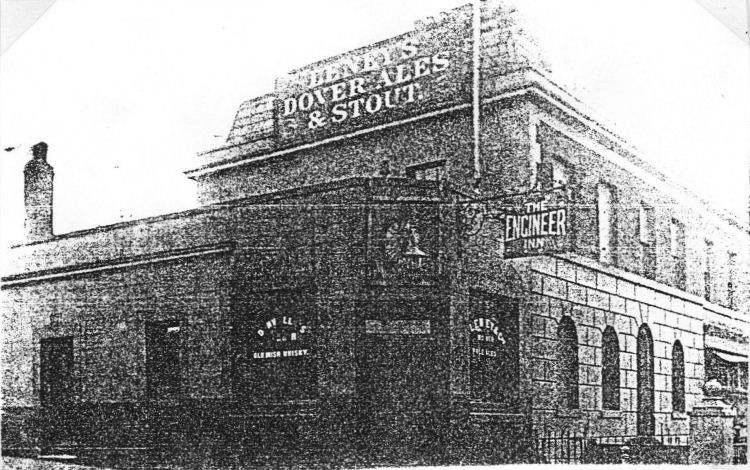 |
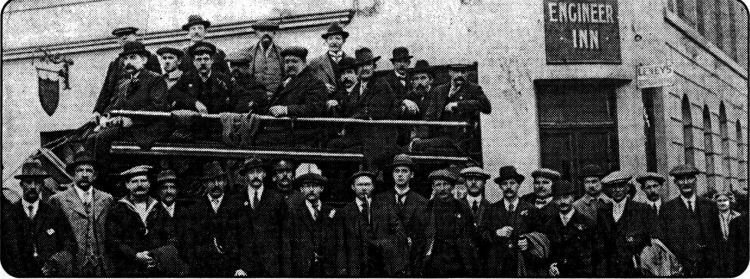
OUTING: An all-male outing from The Engineer corner pub in Folkestone Road |
On the corner with Malvern Road, the number was once sixty. That part of
the road formed about 1870 and during the present century various terraces
have been incorporated into the numbering of the road. The bar portion, like
the "Imperial Crown" has the appearance of a single storey extension made at
some time. Rumour does have it though that the cellar here is enormous by
comparison.
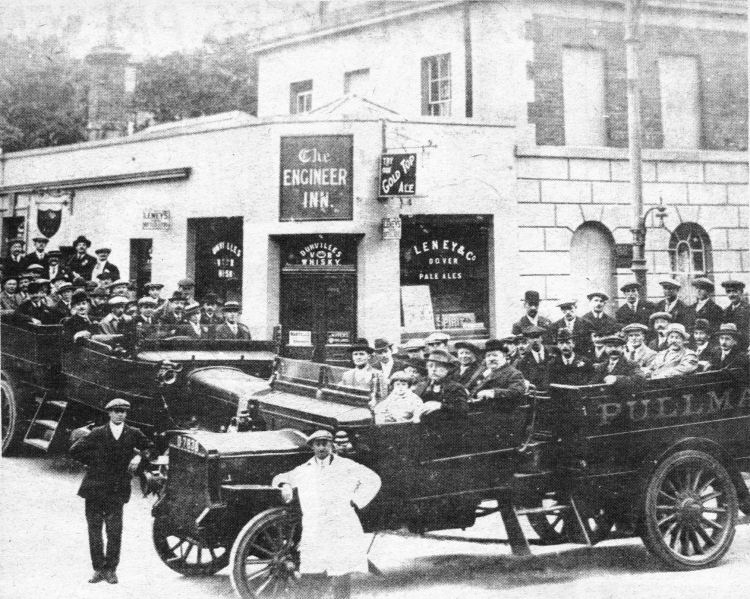 |
|
All set for a day's outing - to the races perhaps -
about 1912. Note the solid tyres and the gun carriage type
wheels of the two open-top charabancs, one of them a Pullman, for this
all-male party. One child also posed for the picture, sitting on grandad's knee on the front seat. The buses are pictured outside the
Engineer Inn, of which the men were presumably customers.
Standing on
the corner of Folkestone Road and Malvern Road, the Engineer was one of
many local public houses which used to sell the beers produced at
Leney's old brewery, between Castle Street and Townwall
Street.
Information taken from John Bavington Jones' book "A Perambulation of
the Town, Port and Fortress of Dover", 1906. (Reprint in The South
Kent Gazette, 12th November, 1980.) |
Supplied by Alfred Leney Co Ltd, who bought out Thomas Walker's Phoenix
Brewery in 1859 and registered as such in 1896, until bought out by Fremlin
Brothers brewery of Maidstone in 1926, brewing at the Dover brewery ceased
in 1927, which later passed to Whitbread.
|
From the Dover Express and East Kent News, Friday 2 July, 1926.
OLD DOVER BOATMAN'S FATAL ACCIDENT.
On Sunday afternoon a well-known Dover boatman, Mr. James Driscoll, who
for some time had been in poor health, met with a fatal accident on the
Folkestone Road, being knocked down by a tramcar. The inquest was held
at the Town Hall on Thursday afternoon by the borough Coroner, Mr. E. T.
Lambert. A jury, of which Mr. E. J. Langley was foreman, was sworn, the
others members being Messrs. H. P. Tarrant, B. S. Breeze, T. Parks, G. Hurn, A. P. Clout and F. Woostencroft.
Mr. Temple, who appeared for the Corporation, expressed their regret and
stated that Mr. Bond, the Tramways Manager would have been there also,
only he was away at the funeral of his father.
Mrs, Hatton, of 14, Devonshire Rd., said that the deceased, James
Driscoll, was her father, and was aged 72 years. He lived at the Dover
Patrol Hostel in Liverpool St. He was a retired boatman. He had been
very shaky in his walk for two years, but had got about and used the
trams a good deal. She saw him on Sunday afternoon after the accident.
He said a tram knocked him down and dragged him.
Tram driver Lester, 14, Mallmains Road, said he was driving from Maxton
on Sunday. On approaching the "Engineer" public house stopping place he
saw Mr. Driscoll standing on the edge of the pavement. He made a move to
go across the road, hesitated a little and then went on again. Witness
immediately applied the brakes hard rang the bell and shouted. Deceased
took not the slightest notice, but continued to walk towards the centre
of the tram line. The car was just about to stop, and he was in the
centre of the track when the car struck him. He fell, and witness got
out and found him under the front of the car. His hand was just behind
the front gate. He was shouting to have the car backed, which was
immediately done. He was lifted into the car and to taken to Worthington
St., and then to the Hospital. When witness just saw the deceased he was
a little over a car's length distant. He was standing directly opposite
the stopping place, and therefore only moving very slowly.
Deceased did not seem to see anything coming but was simply
bent on getting across the road.
By the jury. Mr, Driscoll crossed from the "Engineer" side to the other,
apparently to board the car. His head was down and he was simply going
ahead.
The son in-law of the deceased asked if witness was going slowly, how
was it that the deceased was pushed along two yards.
The Coroner: Is that correct?
Witness: No.
Mr. Hutton: If you were only a car's length away when Mr. Driscoll
started to cross, it would be at Worthington Street before he got to the
tramway track.
The Coroner: That is the witness's statement. If you are in a position
to call evidence to contradict it, I will hear it.
Mr. Hatton: Is this the first fatal accident this fellow has been
involved
in?
The Coroner: That has nothing to do with this Court. You can find out by
making enquiries.
Mr. Cissane, House Surgeon, Dover Hospital, said that the patient was
admitted to the Hospital at 3.15 on Sunday. He found him to be suffering
from a bad fracture of the right thigh near the hip, a fracture of the
right elbow, bruising of the right arm, and shock. He also had large
hernia, that had been successfully treated for years. The straining and
movements caused by the accident pushed the hernia further down, and
rendered it irreducible. On the 28th, the hernia still being irreducible
and causing the patient great pain, an operation was necessary. He was
operated on, on the morning of the 28th. It was successful and only
occupied 15 minutes, and had no bearing on the duration of the
deceased's life.
He died at 10.30 a.m. on the 30th, the cause of death being pneumonia.
In reply to a juryman, witness said a healthy man of little less age
would certainly have recovered.
Train Conductor L. Griggs said he was conducting the tramcar at the
time. On hearing the driver shout he jumped off and saw the deceased on
the ground. The car stopped a second after the shout. When he heard the
shout the tram was going at walking pace —nearly stopped.
Thomas Pinnock, 27, Glenfield Rd., a carriage examiner, Southern
Railway, said he was on the car, on the top. He saw the deceased step
off the curb a car's length away. He saw that if he continued across he
must be knocked down. The next he heard was the life saving apparatus
go. he did not see the deceased fall. The speed must have been slow, as
the car stopped as it hit the man. He did not think that the driver
could have pulled up sooner if he had seen the deceased as soon as
witness did.
Mr. Hatton said that if witness was sitting on the centre of the top of
the car, he could not see the deceased unless he was 10 or 15 yards
away. Witness said that he was sitting on side of the car, on the
“Engineer' side.
Mrs. S. A. Baker, 22, Manor Rd., she was in the tramcar. She was
on the right hand of the inside of the car just behind the driver.
Deceased walked off the pavement, looking neither to the left nor right,
straight in front of the tramcar. She saw him fall. The car was slowing
down when the deceased started off the pavement, and almost stopped when
the deceased fell.
Mr. A. B. Taylor, Headmaster of Christ Church Boys' School, said he was
on the top of the car and saw the deceased on the edge of the pavement
20 yards away. He next heard the warning shouts, and the car pulled up.
He did not see the impact from where was sitting. He helped to get the
deceased out from under the car and take him to tho Hospital. When he
saw the deceased the car was pulling up. There was no jolt at all when
it stopped.
Miss A. E. Knox. 119, Folkestone Road (on the opposite corner to the
“Engineer" public-house) said she saw from the window the deceased
crossing the road. As he got to the tram he seemed to slip and fell
forward. It looked as if he slipped on the rail. When she saw the car it
was at its ordinary pace, just pulling up.
The Coroner said that was all the available evidence. He offered to
adjourn to call further evidence.
The jury said that it was not necessary; and one of the jury said that,
from his personal knowledge, the deceased was hard of hearing. After
retirement the jury that they returned a verdict of accidental death,
and wished to exonerate the driver of any responsibility. They also
Wished to express their deep sympathy with the relatives.
Mr. Driscoll some 30 years ago was coxswain of the Dover lifeboat and
holds the Royal Humane Society's certificate for saving life.
|
|
From Dover Express 07 January 1927.
A theft of £100 in Treasury notes and £5 in silver from a bedroom at the
"Engineer" public-house on Boxing Night has been reported.
|
|
From the Dover Express and East Kent News, Friday 4
February, 1938
ENGINEER BUS SIGN
Councillor Gates said that some months ago the bus stop sign outside
the "Engineer" was knocked down by a motor-car and since then it had
been lying in the yard of the Christ Church Mission hall. He did not
know whether the Surveyor had had any official information that the sign
had been knocked down.
The Surveyor said he did not know anything about it .He did not know
whether there was any special reason why it was not replaced. He would
look into it.
|
|
Dover Express on 4th June 1943.
The funeral took place on Wednesday at Charlton Cemetery of Mr. Harry
Pierce of the “Engineer” Inn, Folkestone Road, who died after a long
illness, patiently borne, at the Kent and Canterbury Hospital at the age
of 66.
The Rev W. F. Jenkins of Christ Church officiated and the mourners
present were:- Mr. & Mrs. A. Pierce (brother and sister-in-law), Miss
E. M. Pierce (niece), Mr. & Mrs. O. Pierce (nephew and niece), Master
K. Pierce (nephew), Mrs. McLeod and Mrs. Pritchard. Friends present at the
graveside were Mr. & Mrs W. Stockwell and Mr. H. Brown. There were a large
number of floral tributes, including one from a few friends at the
“Engineer”. The funeral arrangements were by Mr. H. E. Frost of 145
London Road and 2 Bunkers Hill.
|
|
TRAMPS SUPPER 1946.
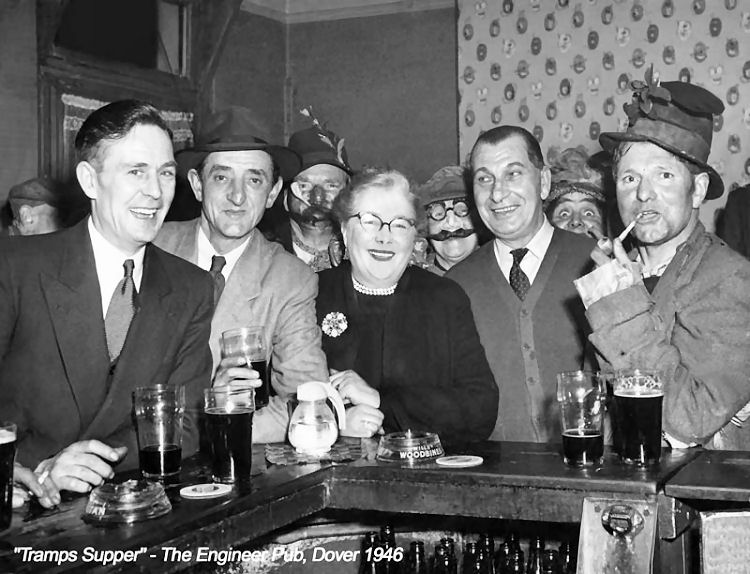
Above photo showing a tramps' supper in 1949 not 46, kindly sent by
Chris Longley.
L-R Front: Benjamin Jarvis in his demob suit, Ray Goldsack, Alice
Peirce, Charlie Peirce (landlord). |
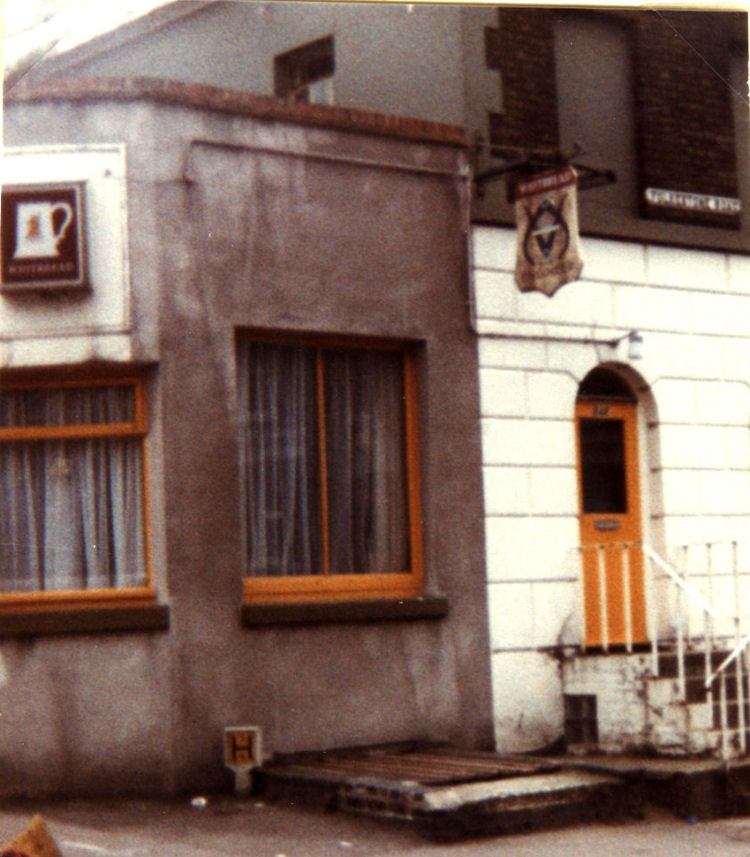
Above the Engineer circa 1980 (Photo by Barry Smith).
|
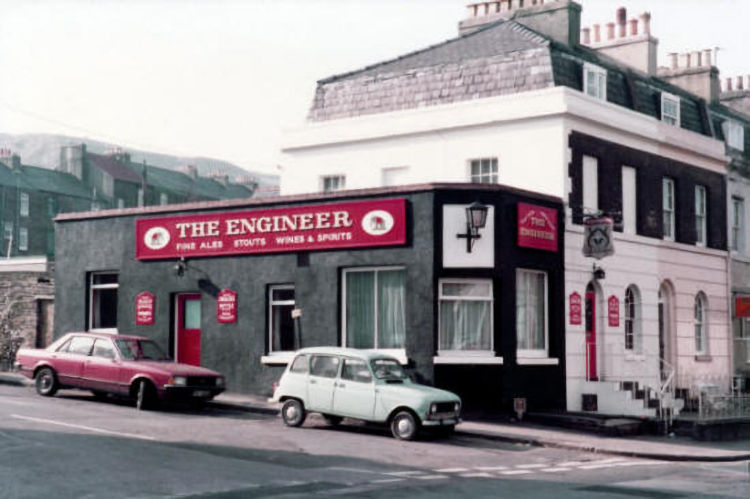
Above photo, 1983. Photo by Eddie Chard. |
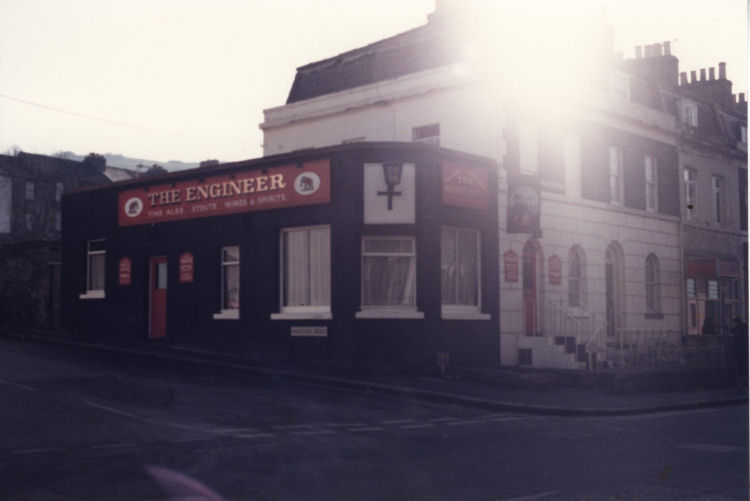
Above Engineer circa 1987 (Photo by Paul Skelton)
|

Above photo, date unknown. |
|
From the Adscene 28 November 1996.
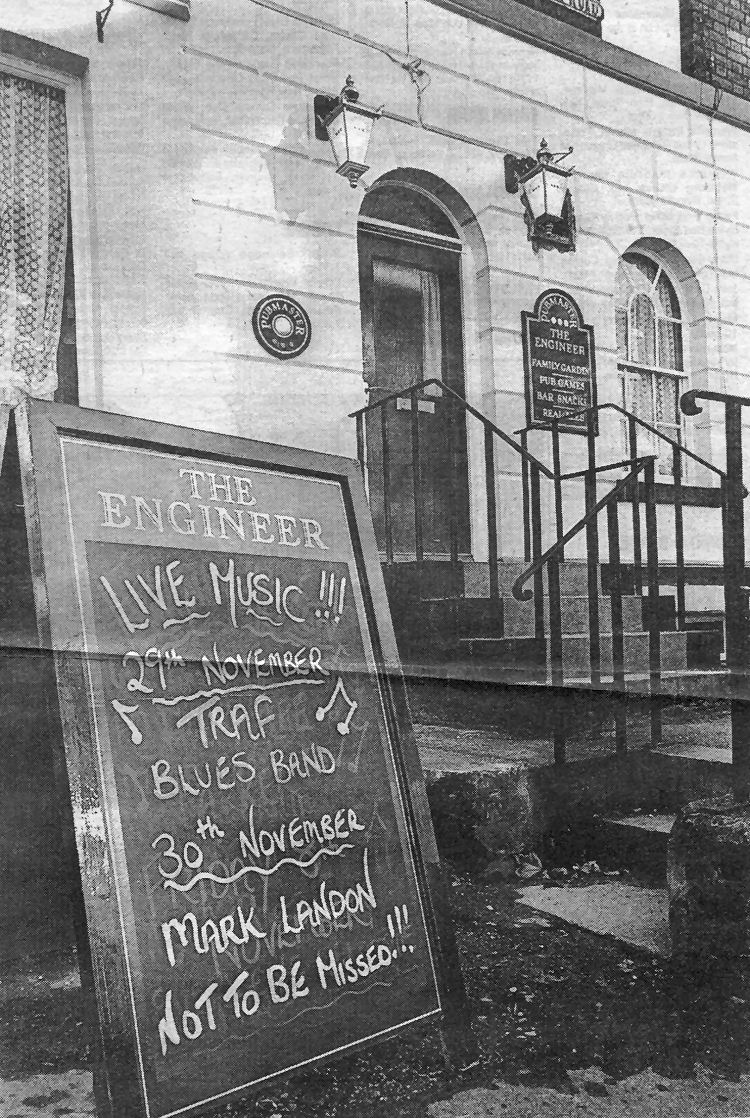
TWO heady nights of live music will hail the grand opening of the
new-look Engineer.
The popular Dover pub becomes bigger and better, with
a £53,000 facelift including a 40 per cent bigger bar area.
Kicking off
the opening celebrations tomorrow night (29 November) will be the
popular Traf Blues Band. On the following nights it's the turn of
talented soloist Mark Landon, who has regularly entertained passengers
on board Stena Line ferries.
Throughout that evening all pints of
draught beer are £1.50 and large main-line spirits,
such as vodka and whisky, are charged at a knock-down £1.80.
The Pubmaster-owned premises will see in the New Year 1997 with music from
Pepperfish, a lively band whose cover versions include Oasis and REM
material.
The new era for The Engineer will also shortly usher in a full menu of
tasty meals, including pub lunches and bar snacks.
The extra space will also mean a larger pool table, which is free daily
until 6pm.
Even without all this you will see a transformation, with the building's
sparkling new internal and external decor.
The Victorian-built pub, on the
corner of Folkestone Road and Malvern Road, was able to stay open while
refurbishment was carried out, with the work area screened off. It is a
long-established cornerstone for the Clarendon and Priory communities,
but is by no means a closed shop.
It also welcomes passing trade and has a multi-national edge through
foreign tourists from nearby bed and breakfast hotels dropping in.
Germans, Dutch, Swiss, Americans and
Japanese have all come in to enjoy an evening pint and the friendly
atmosphere of The Engineer.
The pub's landlord is Glen Virtue, who took over in March 1995 after
eight years' experience running the nearby Alma.
Mr. Virtue has also bought the Trident Guest House, at the corner of
St. John's Road and Folkestone Road, and will rename it The Engineer Guest
House at the end of the year.
The Engineer is open 11am to 11pm Monday to Saturday and noon
to 10.30pm Sunday.
|
|
From the Dover Express, August, 1999
POLICE officers were called to Folkestone Road to prevent an
outbreak of violence as a group of around 40 asylum seekers laid siege
to The Engineer pub.
Cops were called in after residents feared a pitched battle in the
streets after an assault on a 21-year-old immigrant earlier.
Officers with dogs sealed off the road while the crowd was calmed and
four people were arrested.
The landlord of the pub, who was hosting a party to celebrate his
first anniversary in charge of the business, later said he had not been
aware of the trouble brewing outside until police had burst in.
|
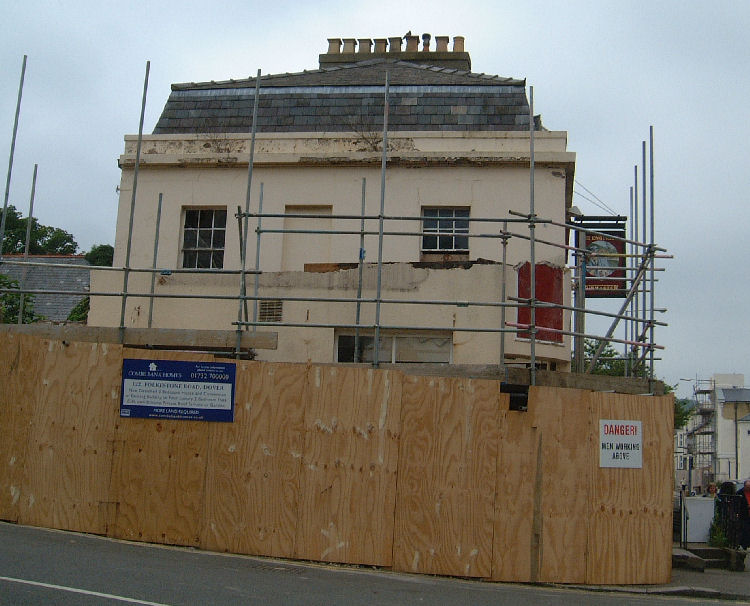
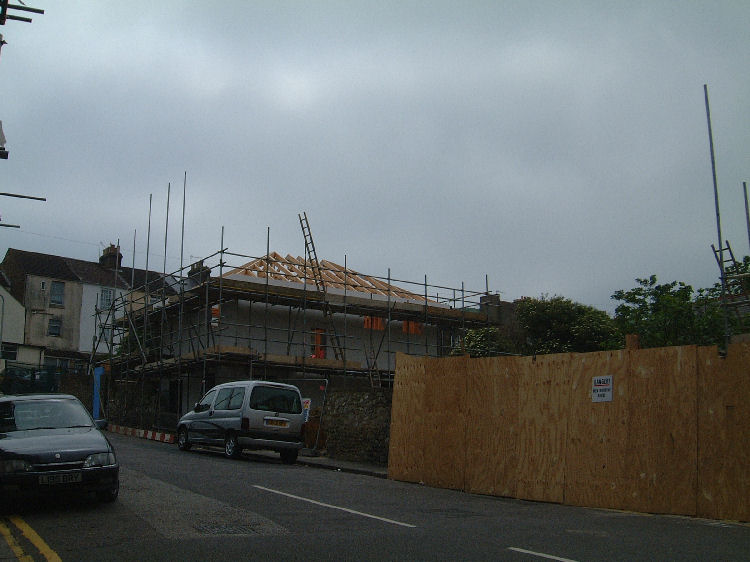
Photos by Paul Skelton 19 June 2008.
Top photo is of the frontage coming down.
Bottom photo shows building work in the garden over the skittle alley
where the pear tree used to be. |
Closed (April 2007).
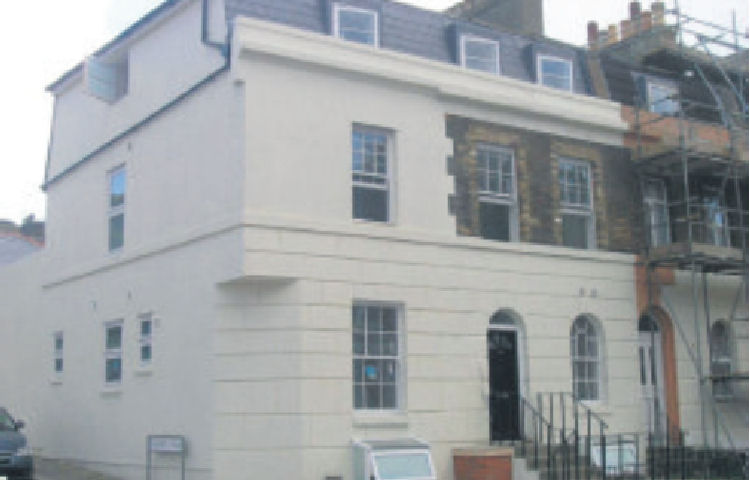
Above photo appeared in the Kent online newspaper, November 2009 and was
an advert for Geering and Colyer stating; "Newly converted flats, two
bedrooms, rear garden, fitted kitchen, £99,950."
No mention of their very spacious beer cellar though. |
LICENSEE LIST
TAMS James 1872-84+
(age 63 in 1881 ) )
 
HEMMINGS Charles 1891

KOHLHAMMER John 1894-99+
 
 BUCKINGHAM Frederick to Dec/1903
BUCKINGHAM Frederick to Dec/1903

  
 QUESTED Edward William Dec/1903-Jan/07
QUESTED Edward William Dec/1903-Jan/07


SARJEANT Harry Jan/1907-Mar/12
 (Formerly telegraph engineer) (Formerly telegraph engineer)

 SPRATT William Mar/1912-27 end
SPRATT William Mar/1912-27 end
    
PEIRCE Charles 1927-40 dec'd
   
PEIRCE Miss Ethel Mildred (Minnie) (daughter) June/1940-48
 
 JAYNES Charles (Wag) 1948-49 end
JAYNES Charles (Wag) 1948-49 end
PEIRCE Charles A H 1949-66+
  
GILCHRIST Mrs Joan 1969-73
GILCHRIST Malcomb M 1974-79 dec'd
 Whitbread Fremlins
Whitbread Fremlins
GILCHRIST Mrs Joan 1980
 FULLER Harold 1980-92 end
FULLER Harold 1980-92 end
GRANT Neil & Peggy 1992
 VIRTUE Glen Mar/1995-96
VIRTUE Glen Mar/1995-96 
https://pubwiki.co.uk/Engineer.shtml
 From
the Post Office Directory 1874 From
the Post Office Directory 1874
 From
the Post Office Directory 1882 From
the Post Office Directory 1882
 From
the Post Office Directory 1891 From
the Post Office Directory 1891
 From Pikes Dover Blue Book 1895 From Pikes Dover Blue Book 1895
 From the Kelly's Directory 1899 From the Kelly's Directory 1899
 From the Post Office Directory 1901 From the Post Office Directory 1901
 From
the Post Office Directory 1903 From
the Post Office Directory 1903
 From the Kelly's Directory 1903 From the Kelly's Directory 1903
 From
the Post Office Directory 1913 From
the Post Office Directory 1913
 From
the Post Office Directory 1922 From
the Post Office Directory 1922
 From Pikes Dover Blue Book 1923 From Pikes Dover Blue Book 1923
 From Pikes Dover Blue Book 1924 From Pikes Dover Blue Book 1924
 From the Post Office Directory 1930 From the Post Office Directory 1930
 From the Post Office Directory 1938 From the Post Office Directory 1938
 From Pikes Dover Blue Book 1932-33 From Pikes Dover Blue Book 1932-33
 From Pikes Dover Blue Book 1938-39 From Pikes Dover Blue Book 1938-39
 From Pikes Dover Blue Book 1948-49 From Pikes Dover Blue Book 1948-49
 From the Kelly's Directory 1950 From the Kelly's Directory 1950
 From the Kelly's Directory 1953 From the Kelly's Directory 1953
 From the Kelly's Directory 1956 From the Kelly's Directory 1956
 Library archives 1974 Library archives 1974
 From the Dover Express From the Dover Express
 Census Census
|


















